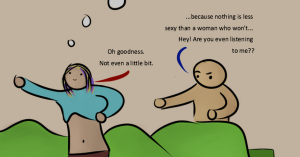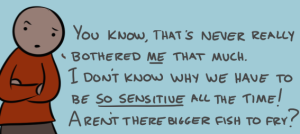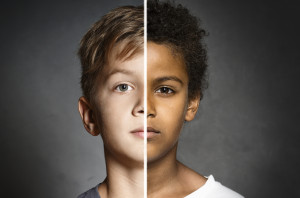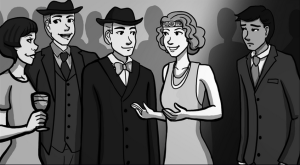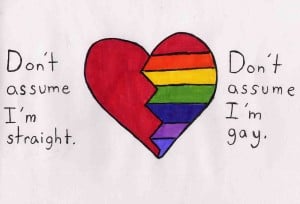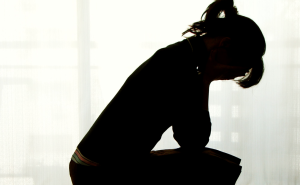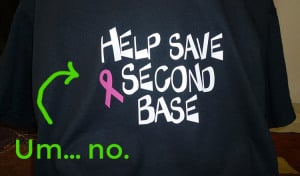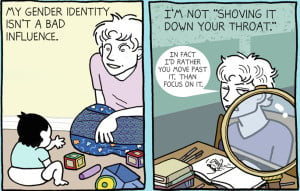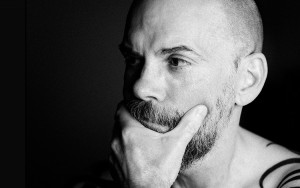
flickr (jayvan)
Originally published on Earth First Journal and cross-posted here with their permission.
There is a war against women, and men and boys are trained everyday to be the soldiers.
Misogynist violence isn’t the biological imperative of men. Misogyny, the worldview that engenders, validates, and normalizes violence against women, is beaten into boys and woven into the fabric of “successful masculinity”.
While very few men consciously choose to be horrible to women, the reality is, everyday “respectable” and “acceptable” norms of how men interact and treat women are infused with male entitlement and male privilege. Together, these norms, contribute to a culture of misogyny, rape, assault, and emotional abuse.
A hallmark of this culture is the tragic indifference of men to women’s lives, leadership, dreams, needs, wants, and futures.
Everyday sexist norms include constant interruptions of women speaking, catcalls on the street, regular comments about women’s appearance rather then their contributions and character, communicating in subtle and blatant ways that men see women as there to serve men’s needs, zoning out when women speak so as to formulate your own thoughts or to sexualize them, ignoring women’s ideas and then repeating them back later as your own ideas, and taking up emotional, verbal, energetic and physical space in ways that silence and push women out.
And when women complain about any aspect of the enormity of patriarchal culture or daily threats and realities of violence, such as the recent explicitly misogynistic and racist mass murderer in Santa Barbara, men overwhelming respond in a chorus of “but not all men act that way”,rather then expressing a profound sadness for the reality of patriarchal culture and violence, followed by a commitment to learn more and take action to change it.
Fear of being implicated, in any way, is greater for far too many men, than fear of what the reality of patriarchal culture and violence means for women in their lives.
But just like soldiers, men aren’t born this way. They are trained.
In workshops on “Men and Feminism” with thousands of men around the U.S. and Canada, I often use an exercise developed by Paul Kivel and the Oakland Men’s Project.
I ask men, “Who here has been told ‘act like a man?’” Almost all the hands go up.
What does that mean, I ask? Typical responses include: “don’t cry,” “always be in control,” “suck it up and be tough,” and “don’t be emotional.”
When I ask what emotions men are allowed to express, I hear: “anger,” “jealousy,” and “resentment.”
I then ask what the men are called when they step out of the “act like a man” box, and a long list of slurs intended to degrade men and boys as either gay or feminized is given.
This training to “act like a man” is intended to turn boys into soldiers – soldiers deeply detached from their emotions, except violent rage and anger, and to internalize misogyny and homophobia as a basis for their masculinity.
I then ask men to raise their hands if they were ever beaten up by male family members or by boys in school for “not acting like a man.” At least half of the hands go up.
“How many of you have ever experienced depression, anxiety, or low self-esteem?” I inquire; almost all the hands go up.
Nearly every hand is raised when I ask, “How many of you have been afraid to tell anyone?”
The exercise ends with a few additional questions. How many of you have used drugs or alcohol to escape? How many of you have used violent or dangerous behavior to escape? How many of you have contemplated suicide?
I raise my hand for many of these, including the last one.
This is the nightmare of patriarchy in the lives of men, and it is a nightmare we perpetuate in subtle and profound ways.
This is the training of soldiers in the war against women, and it is pervasive. But this is not how it has always been.
Throughout the world, throughout history, there have been societies and cultures that were far more egalitarian, without the strict gender roles, where misogynistic violence wasn’t the norm.
To understand why boys are trained to be soldiers, we must look at the other wars they have been trained to be part of.
Misogyny has been and is a weapon of colonization against Indigenous peoples and nations – not only attacking the power of women in Indigenous societies, but forcing patriarchy into those societies to divide and conquer them.
Gender violence was central to the development and organization of the Atlantic slave trade and the system of plantation slavery on the South – using rape to both populate the slave system as the child of a slave is born into slavery, but also again, to dehumanize enslaved women to and further suppress the power of women and fracture the overall community.
Misogyny was and continues to be central to the development and expansion of capitalist economic relationship. Across the globe, communities were uprooted from the land, and gendered divisions of labor hardened: men forced into paid labor to make someone else rich, women into unpaid, unvalued reproductive labor at the same time as men were granted social permission to unleash the rage and misery of their own exploitation and disempowerment on their wives and children.
Learning this history is key to men to help ending the war against women.
From Andrea Smith’s analysis of sexual violence as a tool of genocide, to Maria Mies and Silvia Federici’s writing on violence against women as a tool to divide European peasant and working class communities to construct capitalism, to Angela Davis’s formulation that women in enslaved African communities and in all oppressed communities have been at the forefront of resistance and liberation struggles and therefore, “the slave master’s sexual domination of the black woman contained an unveiled element of counterinsurgency”.
Today, the war on women is the massive number of women who are raped and assaulted.
It is the fact that domestic violence support services get more then 75,000 requests for assistance on a typical day; that domestic violence is the leading cause of injury for women between the ages of 15 and 44, and the leading cause of death for Black women of the same ages.
It is the crisis of over 1200 missing or murdered Indigenous girls and women in Canada over the past 30 years.
It is the disproportionate amount of violence transgender women face from street harassment to police violence.
It is African-American mother Marissa Alexander currently serving 20 years in a Florida prison for firing a warning shot, in which no one was hurt, to scare away her abusive husband while George Zimmerman was found justified in killing unarmed Black teenager Trayvon Martin based on the same legal argument.
The war on women is the U.S. government’s forced sterilization of Indigenous, Black and Latina women over hundreds of years, with it continuing to happen to incarcerated women.
It is the austerity measures of the U.S government gutting publicly funded institutions such as schools, welfare, food stamp programs, and early childhood learning programs, while redistributing money, via tax policy, from working class, poor, and middle class communities to the richest people on the planet.
Austerity measures further put the burden of unpaid labor of maintaining life and society on the backs of women, particularly women of color. Along with colonization and hundreds of years of the Atlantic slave trade, the unpaid reproductive labor of women, is the foundation of capitalism.
The war against women is the gender-based violence of husbands, boyfriends and the state to maintain the structures of unpaid women’s reproductive labor.
While men, in general, reap a wide range of male privileges (with access to those privileges differentiated unequally by race, class, sexuality, ability, citizenship, and nationality), it’s time for men in the millions to declare that we will no longer be the soldiers in the war against women.
That we will no longer perpetuate sexist attitudes, cultural practices and public policies that undermine women’s leadership, dignity, and power in society.
That we will work against the long term impacts of white supremacy, colonization, homophobia, and economic exploitation in society and all of our communities.
Throughout history and today, women have resisted. As men, we must learn from and join with feminist movements to redefine what it means to act like a man, so that we can act like many kinds of men – or other genders entirely.
Some of us can build on our ancestors’ traditions of different kinds of masculinities. In many cases we already have models of masculinity upon which we can draw and find inspiration.
But we must collectively, along with women and people of other genders, redefine masculinities in ways that replace misogyny and homophobia with love and compassion.
We must collectively redefine masculinities in ways that center visions and values of economic, racial, gender, disability and environmental justice.
As men, let us work to heal from the training we’ve received to be soldiers in the war against women, let us look to feminist women’s leadership for vision and guidance of the society we want to live in, and let us join with people of all genders to end the violence and exploitation of all of these wars.
Beyond the nightmare of patriarchy is a world of possibility.
Let us be courageous, and go there together.
***
For Further Reading:
- Feminism is for Everybody: Passionate Politics by bell hooks
- Men’s Work: How to Stop Violence That Tears Our Lives Apart by Paul Kivel
- The Will to Change: Men, Masculinity and Love by bell hooks
- Boys Will Be Men: Raising Our Sons for Courage, Caring and Community by Paul Kivel
- Conquest: Sexual Violence and the American Indian Genocide by Andrea Smith
- Women, Race and Class by Angela Davis
- Patriarchy and Accumulation on a World Scale by Maria Mies
- Caliban and the Witch by Silvia Federici
Author’s Note: Thank you to Andy Cornell, Lydia Pelot-Hobbs, Jardana Peacock, and Chanelle Gallant for feedback.
[do_widget id=”text-101″]
Want to discuss this further? Visit our online forum and start a post!
Chris Crass is the father of a beautiful little boy named River, and is a longtime social justice organizer who writes and speaks widely about anti-racist organizing, feminism for men, lessons and strategies to build visionary movements, and leadership for liberation. He is the author of Towards Collective Liberation: Anti-racist Organizing, Feminist Praxis, and Movement Building Strategy, published by PM Press. He is a Unitarian Universalist and lives in Nashville, Tennessee. His website is www.chriscrass.org.
Search our 3000+ articles!
Read our articles about:
Our online racial justice training
Used by hundreds of universities, non-profits, and businesses.
Click to learn more





